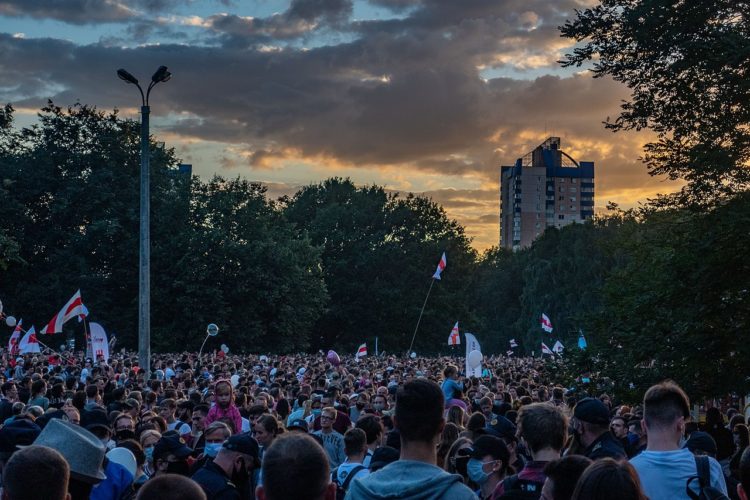Belarus is reeling from protests. Close to 200,000 people took to the streets of Minsk on Sunday to call for the ousting of President Alexander Lukashenko.
Protesters say the recent presidential election of Sunday 9, which saw Lukashenko — who has been in power since 1994 — win with a reported 80 percent of the vote, was marred with fraud. The police violently cracked down on opposition supporters who had taken to the streets to protest the alleged poll-rigging. The Belarussian Tut.by media outlet called the Sunday protests “the largest in the history of an independent Belarus.”
Last week police arrested 6,700 people who protested against the Soviet-style authoritarian leader. Hundreds of people were injured and two were killed. Belarussians claimed that security forces were torturing prisoners.
As the embattled Lukashenko spoke at a Minsk tractor factory, workers booed him and chanted “leave.” Lukashenko was at first defiant, telling the booing crowds, “We held elections already. Until you kill me, there will be no other elections,” according to Tut.by.
His presidential opponent, opposition politician and former English teacher Svetlana Tsikhanouskaya, said on Monday in a video address from Lithuania that she is ready to assume the mantle of leadership. Tsikhanouskaya is in hiding in Lithuania after being forced to leave the country following the crackdown.
“I’m prepared to take responsibility and act as the nation’s leader during this period so the country settles down and gets back to normality,” she said. “The whole world is watching us with admiration and hope.”
Tsikhanouskaya, according to the Central Election Commission, received 10.12 percent of the vote while Lukashenko received 80.1.
With his hold on power slipping, Lukashenko did an about-face later on Monday. He said that he would be ready to hold new elections and hand over power after a constitutional referendum but that he would not do so under pressure from protesters.
However, Russia has agreed to step in and militarily assist its ally, Lukashenko. This could throw the entire region into turmoil. The European Union (EU), had an emergency video conference to discuss the situation.
Russia considers Belarus a buffer zone to the west against NATO. Belarus also has pipelines that carry its energy products to western Europe.
But at least for now, it does not seem likely that Russia will attack Belarus: The protestors aren’t anti-Russian or anti-Putin, but anti-Lukashenko. However, a coup by military forces to remove Lukashenko and “temporarily” hold power until further elections are held is a possibility. And the Russians have certainly done that in the past. Aware of this, Tsikhanouskaya urged police and security officials to recognize her as the rightful ruler.
Already have an account? Sign In
Two ways to continue to read this article.
Subscribe
$1.99
every 4 weeks
- Unlimited access to all articles
- Support independent journalism
- Ad-free reading experience
Subscribe Now
Recurring Monthly. Cancel Anytime.
The protests have affected the media as well. State broadcaster BT had hundreds of employees walk off the job. But they did air Tsikhanouskaya latest video.
“We want to work honestly, we do not want to be forced to lie,” TV host Oleg Titkov said to Reuters.
Ukrainian Foreign Minister Dmytro Kuleba said that he had recalled the ambassador to Belarus for consultations to assess the prospects of further bilateral relations between the two neighbors “in the new reality.”
“The development of events in Belarus, whose society has expressed a vote of no confidence in the official results of the presidential elections in Belarus, is fundamentally changing the situation in Belarusian-Ukrainian relations,” Kuleba said in a statement.
Both the United States and the U.K. have spoken out against what is being characterized as a fraudulent election.
“The world has watched with horror at the violence used by the Belarusian authorities to suppress the peaceful protests that followed this fraudulent presidential election,” British Foreign Secretary Dominic Raab said in a statement. “The UK does not accept the results.”










COMMENTS